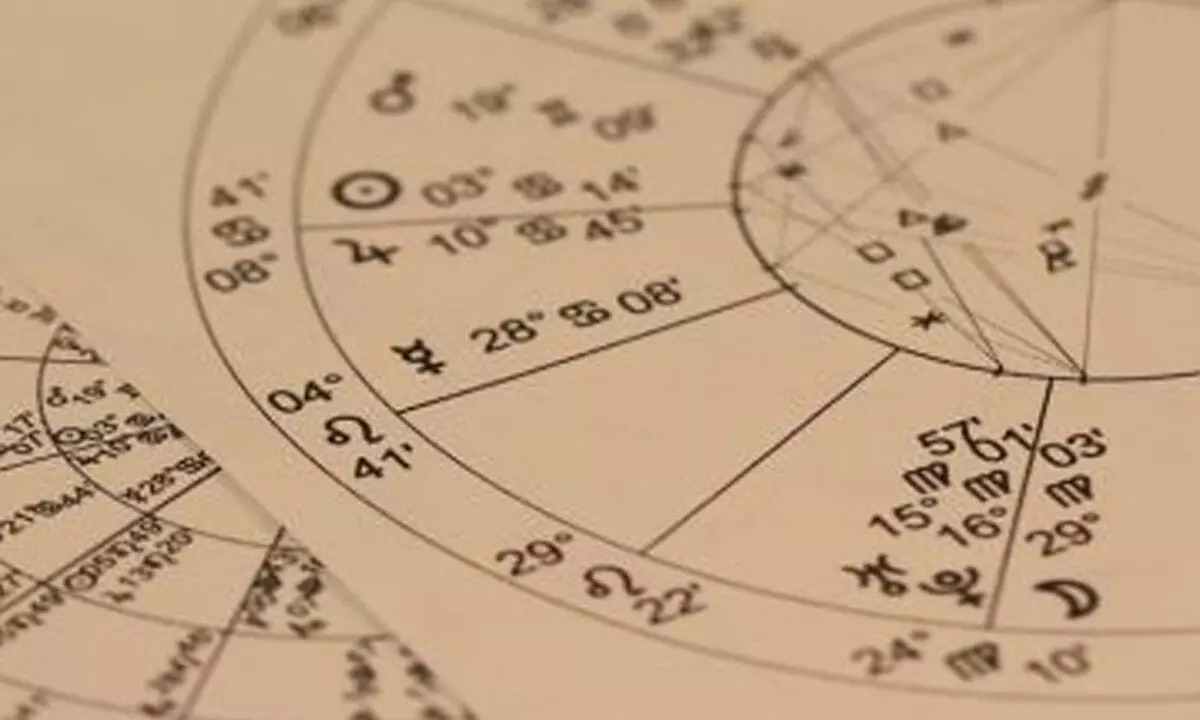Live
- India Faces Blow as Pacer Mohammed Shami Ruled Out for Remainder of Australia Series
- Farmer’s Day Celebrations Held at Palem Agricultural Research Center, Nagarkurnool
- Biden Pardon: Joe Biden Commutes Death Sentences of 37 Inmates, Including Child Killers and Mass Murderers
- South Korea: Yoon believes impeachment trial takes priority over martial law probe
- Strict Action for Non-Adherence to Time Management - DMHO Dr. Swarajya Lakshmi
- Joyful Semi-Christmas Celebrations at Sri Saraswathi International School
- Over 13.29 lakh houses approved for rural poor in Maharashtra: Shivraj Chouhan
- District Collector Urges Timely Completion of Indiramma Housing Scheme Survey
- Digital Arrest Scam: Hyderabad Man Duped of ₹7 Lakhs by Fake Crime Branch Police Callers
- Sukhbir Badal seeks President's Police medal for officer who saved his life
Just In
Is Astrology really a fraud industry?


Is Astrology really a fraud industry?
Astrological systems of the West and India cannot be lumped together
Time and again, numerous attempts have been made to malign the credibility of astrology. One such attempt was made recently when, in a video, a fame-hungry, self-styled influencer described astrology as a 'fraud' industry meant only for feeble minded Indians.
The video's claims regarding the veracity of astrology and other mystical disciplines like numerology seem too bold to be supported by any evidence or in-depth understanding of the topic presented. The astrological systems of the West and India were lumped together without any consideration for their differences. It turned out that the video was really a covert advertising ploy for an audio-book service, and the creator picked a subject connected to astrology because of the subject's widespread popularity throughout the world.
One of the main points of contention has been whether astrology can be considered rational and scientific, or whether it is more akin to a superstition.
The answer to this question lies in the legal dynamics of astrology in India. In 2004, the Supreme Court of India proclaimed astrology as a science. In a historic judgement, the apex court noted, "Astrology is a science, which claims to foretell the future or make predictions by studying the supposed influence of the relative positions of the moon, sun, planets and other stars on human affairs. It, therefore, requires study of celestial bodies, of their positions, magnitudes, motions, and distances, etc..." The court further directed the universities in India to consider adding astrology as a subject.
Again in 2011, the Bombay High Court dismissed a plea that had challenged astrology as science. It refused to consider astrology and other allied sciences like Palmistry as part of The Drugs and Magical Remedies Act of 1954. It sided with the view that astrology is a time-tested science and dates back more than 4,000 years old and refused to ban on practices promoting astrology. Since then, astrology is being taught in several universities in India. In fact, very recently, IGNOU introduced a Master's programme in Jyotishvia distance learning which can only by pursued by students who have completed their undergraduate degree. This goes on to show that there is definitely an educational criterion to study astrology since it involves various computations and abstract ideas. Clearly, astrology cannot be called a 'fraud' industry. The subject matter of astrology is human beings and how they are affected by the motions and placements of the planets, stars, and other heavenly bodies across the Zodiac.
Astrology draws heavily from two 'pure' sciences - Astronomy and Mathematics. Information on the daily motion of the planets and its effect on human behaviour is compiled in a log-book called Ephemeris. In order to determine the precise degree of the ascendant and the planets, complex mathematical calculations must be performed throughout the horoscope-making process. The accuracy of horoscope predictions is highly sensitive to even the smallest of mathematical errors.
In the same way, astrology makes use of the fundamentals of geography like longitude and latitude to interpret the positioning of the stars and planets in relation to Earth. Thus, a significant quantity of "verifiable" data is amassed. The astrologer then analyses the data and uses it to make predictions about the person's life. Like a scientist, an astrologer becomes more reliable and effective with time and practice.
Astrology is undeniably a scientific discipline. It's an integral component of Indian culture and has been for centuries. It was always practised by Indians as a scientific way of life, be it the type of food to be eaten according to the body type, auspicious timings for various activities calculated from the distance between Sun and Moon, health matters, direction of houses, to understand relationship between man and other living and non-living beings and to decipher the purpose of life through karmic patterns generated through subconscious and conscious emotional interplay.
The foundation of astrology is the concept of 'harmony' between the many types of energy in the cosmos. Indians have long looked to astrology as a means to better align their karmas with the energy of nature in pursuit of spiritual bliss and understand truth behind human existence. The science of astrology has been dedicatedly adhered to as a matter of belief and faith. It has been, should be and will always be used as a tool for course correction.
(Writer is an astrologer with proficiency in Vedic, KP and Nadi Astrology. He is Founder and CEO of Astro Zindagi)

© 2024 Hyderabad Media House Limited/The Hans India. All rights reserved. Powered by hocalwire.com






